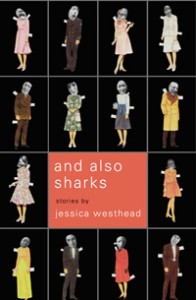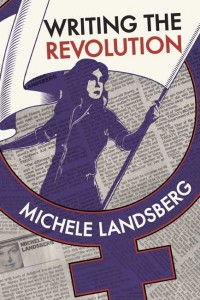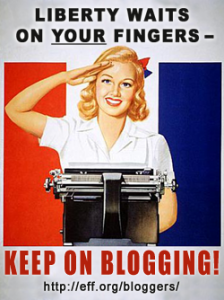April 26, 2012
Funny women
 “This is what I used to think about Sherry– wait, that’s not what I meant to say. I never really thought anything about Sherry. Except that she always seemed like a nice person. I don’t know if I would’ve said before this that she was nice enough to give you the shirt off her back, but when you stop and think about it, that’s a lot to ask from someone.” –Jessica Westhead, “We Are All About Wendy Now”
“This is what I used to think about Sherry– wait, that’s not what I meant to say. I never really thought anything about Sherry. Except that she always seemed like a nice person. I don’t know if I would’ve said before this that she was nice enough to give you the shirt off her back, but when you stop and think about it, that’s a lot to ask from someone.” –Jessica Westhead, “We Are All About Wendy Now”
This is from page 3 of Jessica’s collection And Also Sharks. And now is the time when I think we need to start an award for women’s humour writing, because I don’t think the establishment gets it. Also Caroline Adderson, Zsuzsi Gartner (the exchange student riding the tortoise!!!), Heather Birrell (“Geraldine and Jerome”, anyone? So funny: ‘”It’s okay,” said Geradline. “I like your belt.”‘), Anne Perdue, Julie Booker, Anakana Schofield, Esme Claire Keith, Laura Boudreau, Lynn Coady, Suzette Mayr, Carolyn Black (Martin Amis! Remember Martin Amis?).
We could fill a fucking ballroom.
The humour is so dark and subtle though, with all of these women. Perhaps this is what the Leacockians aren’t getting (and when is the last time you laughed out loud at Sunshine Sketches, laughed so hard that you woke up your husband and then insisted on reading him entire paragraphs? Seriously?).
In these books are suicides, paraplegics, decapitations, dead babies, and maimed pot-bellied pigs. And they’re so funny they’ll make your heart hurt. Which is way funnier than heart-hurt caused by systemic discrimination and disregard of brilliant women writers, no?
Ha ha ha.
UPDATE: In all fairness, I see that the list of entries for this year’s Leacock Prize did not include many of last year’s funniest books. Though if I were them, I’d still want to revamp my program to get a broader range of books to choose from.
April 22, 2012
The Famous 5
 So many things I love are a part of this photo. Also, we had a really wonderful trip to Ottawa this weekend. Lots of reading on the train, hotel fun, good food, friends, and, speaking of friends, we were the beneficiaries of some amazing hospitality. Long live the Mini-Break!
So many things I love are a part of this photo. Also, we had a really wonderful trip to Ottawa this weekend. Lots of reading on the train, hotel fun, good food, friends, and, speaking of friends, we were the beneficiaries of some amazing hospitality. Long live the Mini-Break!
April 12, 2012
So I am required to support stupid women writers now?
I am confused. Meg Wolitzer writes an essay about how “women’s fiction” gets lumped into one big bucket of dross. Essay gets writers talking. Writers begin taking offence to distinctions being made in that big bucket of women’s fiction, dross and all. Apparently we’re supposed to embrace the bucket. “Support Women Writers!” becomes a rallying cry, caveats forbidden. Jennifer Weiner tweets, “Thing that drives me crazy: essays re: women’s lit that begin, “now, I’m not talking about ALL books by women, just the ones I approve of.”” But isn’t the problem in the first place that too many people are talking about ALL books by women like it’s just one thing? Someone else makes a video called “Support Women Writers! (But Not The Stupid Ones)”, and I’m thinking, “Right on! Oh, wait. This is supposed to be sarcastic?”
So I am required to support stupid women writers now? The ones whose stupid books are the reason women writers get such a bad rap in the first place?
I support women writers not out of a knee-jerk sisterhood reaction, but because I know that our literature is richer for the inclusion of female authors and female characters in the canon. I know that our magazines and journals (which, incidentally, are not exactly part of a thriving industry, so perhaps they might heed a bit of advice) will be better when they cease to neglect work by half the population. I support women writers because for reasons related to prejudice and marketing, so many great ones are being passed over by the other half of the population who themselves are losing out on essential reading experiences.
“The difference of value persists,” wrote Virginia Woolf (and also wrote me), but the commercial/literary divide wasn’t the difference we were writing about. This argument keeps getting hijacked over and over again.
UPDATE: A line from this wonderful post about “girls books” and “boys books” is applicable to the women writers issue: “The secret is that it simply has to be a good book.” And while I agree that dividing children’s books by the gender of their intended readers is bad for everybody, it’s complicated because I do acknowledge that there is such thing as a woman’s book in terms of adult fiction: “…it would be a fallacy to pretend that all fiction is universal; worse, to demand universality as a quality standard is to say that drawing-room women are insignificant, that sisters, wives and daughters do not matter… [But] I can’t help but wonder where the onus lies in the failure of women’s writing to achieve universality – what is it that lets us down, the stories or their readers?”
The point is that the gender line (sometimes) exists, but as readers we all have to be fearless and open to challenge enough to keep on crossing it, to teach our children to cross it too. The secret is that it simply has to be a good book.
April 4, 2012
Meg Wolitzer's Rules
“If “The Marriage Plot,” by Jeffrey Eugenides, had been written by a woman yet still had the same title and wedding ring on its cover, would it have received a great deal of serious literary attention? Or would this novel (which I loved) have been relegated to “Women’s Fiction,” that close-quartered lower shelf where books emphasizing relationships and the interior lives of women are often relegated? Certainly “The Marriage Plot,” Eugenides’s first novel since his Pulitzer Prize-winning “Middlesex,” was poised to receive tremendous literary interest regardless of subject matter, but the presence of a female protagonist, the gracefulness, the sometimes nostalgic tone and the relationship-heavy nature of the book only highlight the fact that many first-rate books by women and about women’s lives never find a way to escape “Women’s Fiction” and make the leap onto the upper shelf where certain books, most of them written by men (and, yes, some women — more about them later), are prominently displayed and admired. ”
Yes, yes, and read the rest fromMeg Wolitzer’s “On the Rules of Literary Fiction for Men and Women”.
(My only qualm is when the women who write really terrible [and usually non-literary] fiction read this and jump up and down screaming, “Right on!” As Dorothy Parker said [and what didn’t Dorothy Parker say?], “I’m a feminist, and God knows I’m loyal to my sex, and you must remember that from my very early days, when this city was scarcely safe from buffaloes, I was in the struggle for equal rights for women. But when we paraded through the catcalls of men and when we chained ourselves to lampposts to try to get our equality– dear child, we didn’t foresee those female writers.” Indeed. Hmm.)
March 13, 2012
Never Mind the Patriarchy: Three Books for International Women's Day
 Renee Rodin’s Subject to Change was recommended to me via Anakana Schofield’s list of her favourite Vancouver books, and I fell in with with the cover, its light, those clothes. And though Rodin’s approach is very different (these are essays, not short stories), I was reminded of Grace Paley’s Enormous Changes at the Last Minute all the way through, and not just due to similarities in title. Also of Madeline Sonik’s Afflictions and Departures, which more overtly links the personal and political in a collection of essays. Like Paley, Rodin writes about an eccentric, passionate, left-leaning single mother, who is dare-to-be-errant, who scrambles to balance motherhood with writing, and who sees motherhood as a role that comes with political responsibility, and knows a good neighbourhood like Jane Jacobs does. Rodin writes of her upbringing in Jewish Montreal, begins one essay with “…when I was a teenage beatnik”, recounts her experience as a bookstore owner in the ’80s and ’90s, accosts BC Premier Gordon Campbell in the street, serves on a jury, takes care of her father at the end of his life, watches the twin towers fall with her sons in New York City, becomes a grandmother, confronts grief and the unimaginable reality of violent death with the murder of her son’s fiancee– the irresolvable nature of such things, and writes, “It is hard to be consoled and it is hard to console.” These essays are familiar, engaging, and unforgettable, kitchen-sink feminism as written from the trenches.
Renee Rodin’s Subject to Change was recommended to me via Anakana Schofield’s list of her favourite Vancouver books, and I fell in with with the cover, its light, those clothes. And though Rodin’s approach is very different (these are essays, not short stories), I was reminded of Grace Paley’s Enormous Changes at the Last Minute all the way through, and not just due to similarities in title. Also of Madeline Sonik’s Afflictions and Departures, which more overtly links the personal and political in a collection of essays. Like Paley, Rodin writes about an eccentric, passionate, left-leaning single mother, who is dare-to-be-errant, who scrambles to balance motherhood with writing, and who sees motherhood as a role that comes with political responsibility, and knows a good neighbourhood like Jane Jacobs does. Rodin writes of her upbringing in Jewish Montreal, begins one essay with “…when I was a teenage beatnik”, recounts her experience as a bookstore owner in the ’80s and ’90s, accosts BC Premier Gordon Campbell in the street, serves on a jury, takes care of her father at the end of his life, watches the twin towers fall with her sons in New York City, becomes a grandmother, confronts grief and the unimaginable reality of violent death with the murder of her son’s fiancee– the irresolvable nature of such things, and writes, “It is hard to be consoled and it is hard to console.” These essays are familiar, engaging, and unforgettable, kitchen-sink feminism as written from the trenches. 
The best of Michele Landsberg’s Toronto Star columns have been collected as Writing the Revolution, which I heard about because when her launch took place around the corner from my house, lines of people stretched all the way down the street. To read these columns (from the 1970s to early 2000s) in our current climate is to encounter a bizarre sense of how far we’ve come coupled with being stuck in a time warp. It feels like a different country from one in which bookstores were being firebombed (also around the corner from my house, just a different corner), there was no such thing as maternity leave, and rapists went free due to a variety of reasons women were “asking for it”. But not too far south from us, they’re letting a lunatic who wants to outlaw birth control imagine he’s a serious contender for US presidency, women’s organizations in Canada are no longer publicly funded, and there was that charming police officer whose wardrobe advice inspired the Slut Walks. Landsberg writes, “Because our history is constantly overwritten and blanked out…., we are always reinventing the wheel when we fight for equality.” Landsberg’s passion for and hope for the future of feminism is inspiring and this book is essential reading, providing the kind of perspective that’s entirely necessary if feminists want to keep moving forward.
 And then there’s Caitlin Moran’s How to Be a Woman, which I discoverered here. Germaine Greer meets Adrian Mole in this book that had me literally howling with laughter, and reading entire chapters aloud to my husband in bed, which is difficult when one is howling. Howling and honking, even. Yes, here is the book I’ve been waiting my whole life for and which I’m going to buy a copy of so my daughter can read it herself as soon as she cares to. So she will know from the start that there’s one woman who dares to say that brazilian waxes are stupid, high heels are crippling, who asks why no one makes porn in which women are enjoying themselves, and points out that no man really cares what your underpants look like. Liberator of obsessively-masturbating teenage girls! Not remotely sorry for her abortion! Who wants to take back the strident in strident feminist! She writes, “So here is a quick way of working out if you’re a feminist. Put your hand in your pants. a) Do you have a vagina? b) Do you want to be in charge of it?”I want to read you entire chapters too, or maybe the whole book, but that will take too long, so why not just read it? You’ll howl too, and you’ll also be uplifted by the fact that the voice of reason is fucking hilarious.
And then there’s Caitlin Moran’s How to Be a Woman, which I discoverered here. Germaine Greer meets Adrian Mole in this book that had me literally howling with laughter, and reading entire chapters aloud to my husband in bed, which is difficult when one is howling. Howling and honking, even. Yes, here is the book I’ve been waiting my whole life for and which I’m going to buy a copy of so my daughter can read it herself as soon as she cares to. So she will know from the start that there’s one woman who dares to say that brazilian waxes are stupid, high heels are crippling, who asks why no one makes porn in which women are enjoying themselves, and points out that no man really cares what your underpants look like. Liberator of obsessively-masturbating teenage girls! Not remotely sorry for her abortion! Who wants to take back the strident in strident feminist! She writes, “So here is a quick way of working out if you’re a feminist. Put your hand in your pants. a) Do you have a vagina? b) Do you want to be in charge of it?”I want to read you entire chapters too, or maybe the whole book, but that will take too long, so why not just read it? You’ll howl too, and you’ll also be uplifted by the fact that the voice of reason is fucking hilarious.
Oh, to read three brilliant, engaging, non-academic feminist books in a row. It did something to me, though spring and sunshine might deserve some of the credit too, but by the end of Caitlin Moran, I felt amazing, unstoppable, and gorgeous without caveats. As radiant as Renee Rodin in the sunshine. Enormously proud to be carrying on the feminist tradition, and content to be as strident as they come.
March 12, 2012
Think more widely
“Progress has been made… yet the struggles continue, the passion and fury can erupt at any time, and many of feminism’s most cherished victories are continually menaced. The media constantly polarize the debates by pitting groups of women against each other, like stay-home moms versus daycare users, or pro-and anti-choice campaigners, or “pro-sex” women against those dried up prudes who want to spoil all the fun. The tactic isn’t new: First Wave suffragists were also derided and parodied as anti-sex killjoys and harridans. The trick to evading these binary traps is to think more widely. Who economic, sexual, class or political interests are being served by the female mouthpieces and role models provided by the media? The answers can be complex, but at least they’re more thought-productive than the simple-minded oppositions (home or career? breast or bottle?) so dear to the media.” –Michele Landsberg, Writing the Revolution
July 6, 2011
Literary Women: The Womanly Art of Blogging
 I’ve written a short essay on women and blogging for the wonderful blog Women Doing Literary Things, in which I write, “I’m not saying there aren’t any male bloggers—I just don’t read many of them. Though I also don’t read a lot of blogs written by women too: craft blogs, parenting blogs, home renovation blogs, fashion blogs, pregnancy blogs, infertility blogs, food blogs, and blogs about vintage rocking chairs. But the blogs that interest me, the literary ones— from the perspectives of common readers, academics, novelists, poets, mothers, book fetishists, illustrators, librarians, literary gossips, and critics alike—almost all of them are written by women.”
I’ve written a short essay on women and blogging for the wonderful blog Women Doing Literary Things, in which I write, “I’m not saying there aren’t any male bloggers—I just don’t read many of them. Though I also don’t read a lot of blogs written by women too: craft blogs, parenting blogs, home renovation blogs, fashion blogs, pregnancy blogs, infertility blogs, food blogs, and blogs about vintage rocking chairs. But the blogs that interest me, the literary ones— from the perspectives of common readers, academics, novelists, poets, mothers, book fetishists, illustrators, librarians, literary gossips, and critics alike—almost all of them are written by women.”
You can read the whole thing here, and I’d love it if you did.
May 8, 2011
Mothers are people
 Before I had a baby, I thought the song “Parents are People” from Free to be You and Me was about the wide range of employment opportunities available to men and women everywhere in this brave new world– that some mommies drive taxis and sing on TV, and daddies play cello or sail on the sea. And then I had a little baby and for a while (in retrospect, a very little while, but at the time I didn’t know this) my entire self was erased, and it dawned on me that the song was about how parenthood doesn’t have to constitute the entirety of a parent’s identity (though I’ve got no qualms about those for whom it does. Parenthood is a noble and worthwhile calling).
Before I had a baby, I thought the song “Parents are People” from Free to be You and Me was about the wide range of employment opportunities available to men and women everywhere in this brave new world– that some mommies drive taxis and sing on TV, and daddies play cello or sail on the sea. And then I had a little baby and for a while (in retrospect, a very little while, but at the time I didn’t know this) my entire self was erased, and it dawned on me that the song was about how parenthood doesn’t have to constitute the entirety of a parent’s identity (though I’ve got no qualms about those for whom it does. Parenthood is a noble and worthwhile calling).
Lately I’ve been extending my thoughts on the song and imagining it in terms of a mathematical equation though. (This is the kind of thing that occupies my mind as I push a stroller down the sidewalk looking kind of vacant.) If Mommies=People [with children], therefore People=? The logical answer is that People are People, but even Depeche Mode didn’t manage to get to the bottom of that matter. Indeed, why should it be that you and I should get along so awfully? But it does clear up the matter of why mothers can’t seem to get it together and support each other. Because mothers are people, and people just don’t do that.
Case in point, the story in the Toronto Star this week: “These moms refuse to wear sweats”, which makes the argument that motherhood doesn’t mean we have to stop wearing skinny jeans and motorcycle boots. My initial response is “ugh” for many reasons, chief among them being that I never looked that nice even before I had a child, and also because I don’t have the money, figure or talent to ever look like the skinny jeans moms do.
But I realize that these women are fighting the same mommy stereotypes that I grapple with. “Motherhood doesn’t have to mean  sweat pants, baggy tops and bad perms” so the article goes, which is analogous to my own crusade, which is “Motherhood doesn’t have to mean being an idiot”. I’m not sure who exactly are these mythical frumpy idiotic mothers we’re all running from, unless we’re all running from the very worst fears we harbour of ourselves. And these selves are so various, and we’re all running so hard that it starts to look like we’re running from each other, but we’re not.
sweat pants, baggy tops and bad perms” so the article goes, which is analogous to my own crusade, which is “Motherhood doesn’t have to mean being an idiot”. I’m not sure who exactly are these mythical frumpy idiotic mothers we’re all running from, unless we’re all running from the very worst fears we harbour of ourselves. And these selves are so various, and we’re all running so hard that it starts to look like we’re running from each other, but we’re not.
Or perhaps what I mean is that we’re not mothers divided as much as people with children who never had all that much in common in the first place.
I can’t tell you how wonderful it is to be out of the first year or so of motherhood. Those months when everything is so urgent, so terrifying, and so unsure that you just cling to something that may be true in order to make sense of a chaotic universe. On top of the practical matters of new motherhood was how threatened I was by other mothers and their choices. I was told that this would lessen as I became more assured, and it’s true. I think we all muddle through, and there’s no one way to do it, and that families are people as much as mommies are, and people are.
(I also think that that Tina Fey’s Fuck You to breastfeeding in her book Bossypants should be required reading for anyone who gets upset at the sight of formula fed babies. And I think that anyone who finds breastfeeding evangelicals offensive should consider the innumerable ways that breastfeeding mothers are only superficially supported in our society. And then should go read the Tina Fey chapter and feel better about everything.)
Lately I’ve noticed my failure to find my place in the mom dichotomy. Either I should be always putting my children’s need first (this rarely happens. Harriet is a fairly robust human being, and therefore under normal circumstances, her needs are pretty much on par with my own) or taking time for myself and having a manicure (which has never happened. Because it is very difficult to read and have a manicure, or so I imagine. See notes above about me being frumpy). The great thing about this lack of inclusion, however, is that I don’t have be involved in the mom dichotomy at all. Because, well, mommies are people with children, and people are…
And in such open endedness lies liberation and infinite possibility.
 There is a book called The Happiest Mom that I’ve been eager to get my hands upon, most because, like all the best parenting books, it might validate all the choices I have already made. (Also, if you’re newish to this blog, read Dream Babies by Christine Hrdyment, which will teach you that all baby/parenting books are faddish fluff, and you are your own best parenting expert if only you have the confidence to believe it). I love the idea of a book suggesting that happy motherhood is possible (it is!) and that there’s a way to get there (and there are many!).
There is a book called The Happiest Mom that I’ve been eager to get my hands upon, most because, like all the best parenting books, it might validate all the choices I have already made. (Also, if you’re newish to this blog, read Dream Babies by Christine Hrdyment, which will teach you that all baby/parenting books are faddish fluff, and you are your own best parenting expert if only you have the confidence to believe it). I love the idea of a book suggesting that happy motherhood is possible (it is!) and that there’s a way to get there (and there are many!).
For me, the way to get there has involved a husband who’s as good a mother as I am, a life that gives me plenty of time to myself, and not having another child anytime soon because I think it would probably break me. An individual path, but it works for me, and so I feel so lucky to be celebrating my second Mothers’ Day (or my third, if we count the Mothers Day I spent having an external cephalic version).
First, because we had a lovely evening with own mom. And because my husband and daughter gave me a basil plant and license to run wild in the bookstore this afternoon (I got I’m a Registered Nurse Not a Whore by Anne Perdue, and The Bradshaw Variations by Rachel Cusk, whose novels I can’t get enough of). They also accompanied me on A Pro-Choice Jane’s Walk around downtown Toronto today in the glorious sunshine, which is fitting because my own reproductive freedom is part of why I get to be a happy mother.
I’m so grateful for the choices I’ve been able to make on the road to here.
March 27, 2011
That annoying thing that women do
 This is not so important, but it occurs to me that I’ve been doing that annoying thing that women in my situation tend to do. Making comments about professional tea-guzzling and reading with my feet up, and though these things are practically absolutely true, they’re not the whole picture. I have a tendency toward self-deprecation anyway (it’s just easier that way), and I also don’t find the demands of stay-at-home motherhood particularly arduous, mostly because I have only one child who sleeps a lot, and a small house that requires little maintenance (plus we keep our standards very low). Life for me is very good, though to play the role of the idle hausfrau would be disingenuous (though this does not change the fact that tedious maneuvering really is the story of my life. Let that fact stand).
This is not so important, but it occurs to me that I’ve been doing that annoying thing that women in my situation tend to do. Making comments about professional tea-guzzling and reading with my feet up, and though these things are practically absolutely true, they’re not the whole picture. I have a tendency toward self-deprecation anyway (it’s just easier that way), and I also don’t find the demands of stay-at-home motherhood particularly arduous, mostly because I have only one child who sleeps a lot, and a small house that requires little maintenance (plus we keep our standards very low). Life for me is very good, though to play the role of the idle hausfrau would be disingenuous (though this does not change the fact that tedious maneuvering really is the story of my life. Let that fact stand).
I thought of an excerpt from a review I read recently of Shirley Jackson’s work (“Dye the Steak Blue”  by Lidija Haas), and though I’m no Shirley Jackson, obviously, I can understand why Betty Friedan was annoyed by her, and I’m setting the matter straight here because I’m a little annoyed at myself. From the review: “Friedan called [Jackson] an Uncle Tom, one of those women who disingenuously portrayed themselves as ‘just housewives’, ‘revelling in a comic world of children’s pranks and eccentric washing machines’, affecting to find a challenge in the most routine chores and concealing the ‘vision, and the satisfying hard work’ which went into their proper vocation, as writers.”
by Lidija Haas), and though I’m no Shirley Jackson, obviously, I can understand why Betty Friedan was annoyed by her, and I’m setting the matter straight here because I’m a little annoyed at myself. From the review: “Friedan called [Jackson] an Uncle Tom, one of those women who disingenuously portrayed themselves as ‘just housewives’, ‘revelling in a comic world of children’s pranks and eccentric washing machines’, affecting to find a challenge in the most routine chores and concealing the ‘vision, and the satisfying hard work’ which went into their proper vocation, as writers.”
So though my washing machine is terribly eccentric (in fact, it would be better termed a “kind-of washing machine” and it sometimes smells like it’s about to catch on fire), and though I do take pride in managing my household (which is no small task, as anyone who’s ever lived in a household realizes), I only do housework when my child is awake, and whenever she’s asleep, feet-up or otherwise, I am usually at work on something related to writing. I work very hard at this blog, on my freelance assignments, at reading thoughtfully and writing book reviews that communicate this, at writing fiction, at creating new projects and at being a part of a wider creative community. At managing to contribute to our household income through my creative work. And I absolutely love all of it. It is tremendously important to me.
So this is not to be the writer’s equivalent of those wretched Facebook statuses that made me hate mothers just as much as the rest of society does (“So you ask, do I work? Uh yes, I work 24 hours a day. Why? Because I am a Mom… I don’t get holidays, sick pay or days off. I work through the DAY & NIGHT. I am on call at ALL hours. re-post if you are a proud Mommy “). I just think I was selling myself short before, affecting a little too much, which isn’t surprising– there is unease that comes with being a stay-at-home mother. But I am also a feminist, and I’d never want to let Betty Friedan down.
Also, I much appreciate the friends who’ve been so supportive about last week’s news. Since the shock has worn off, we’re very positive about things, and even grateful that the right decision has made, in particular because it’s one we might not have been brave enough to make on our own.
February 9, 2011
How about this? One magazine thinks about its gender gap.
 From Kim Jernigan’s introduction to The New Quarterly 117: “When making their choices for this issue, the poetry editors were thinking seasonal, in part, but our fiction editors, of which I’m one, were thinking thematic. Worrying, I should say, that our choices might be falling into a predictable pattern, specifically that we were tending too often to mother/daughter stories. Four of our five editors on the fiction side are women, and of those, three are mothers. Were we looking to see our own lives reflected on the page?
From Kim Jernigan’s introduction to The New Quarterly 117: “When making their choices for this issue, the poetry editors were thinking seasonal, in part, but our fiction editors, of which I’m one, were thinking thematic. Worrying, I should say, that our choices might be falling into a predictable pattern, specifically that we were tending too often to mother/daughter stories. Four of our five editors on the fiction side are women, and of those, three are mothers. Were we looking to see our own lives reflected on the page?
…But I think our choices reflect less our demographic than the thematic cast of the submissions as a whole. For whatever reason, the fiction we receive tends not towards work, or war, politics or race relations or environmental catastrophe, but towards the familial and relational.
At least we’ve captured some fathers and sons this round…”
In a week during in which we were once again informed that the gender gap for magazine contributers continues to be gaping, it was refreshing to read of an editor and her editorial board conducting their business with these ideas in mind. It would nice if more editors would do the same, in particular those whose mags are suffering from a dearth of women writers.
And “suffering” is the right word. Come on now, it’s not like magazines are doing really well the way things are. Something needs to change, and correcting this disparity this would be a step in the right direction. I’m not just ranting on principle either– a diverse body of writers makes for better and more interesting content. Everybody wins.





